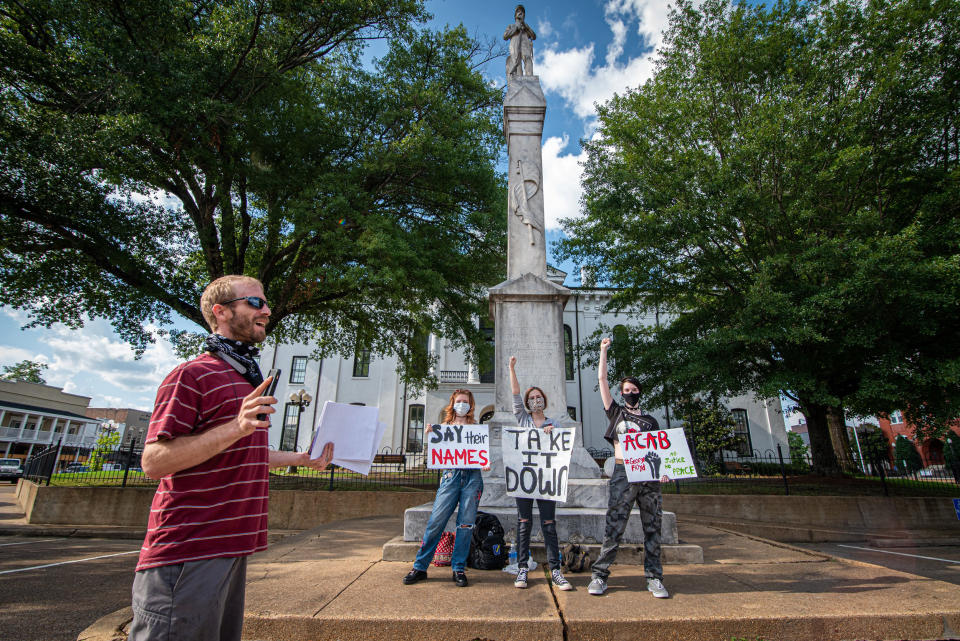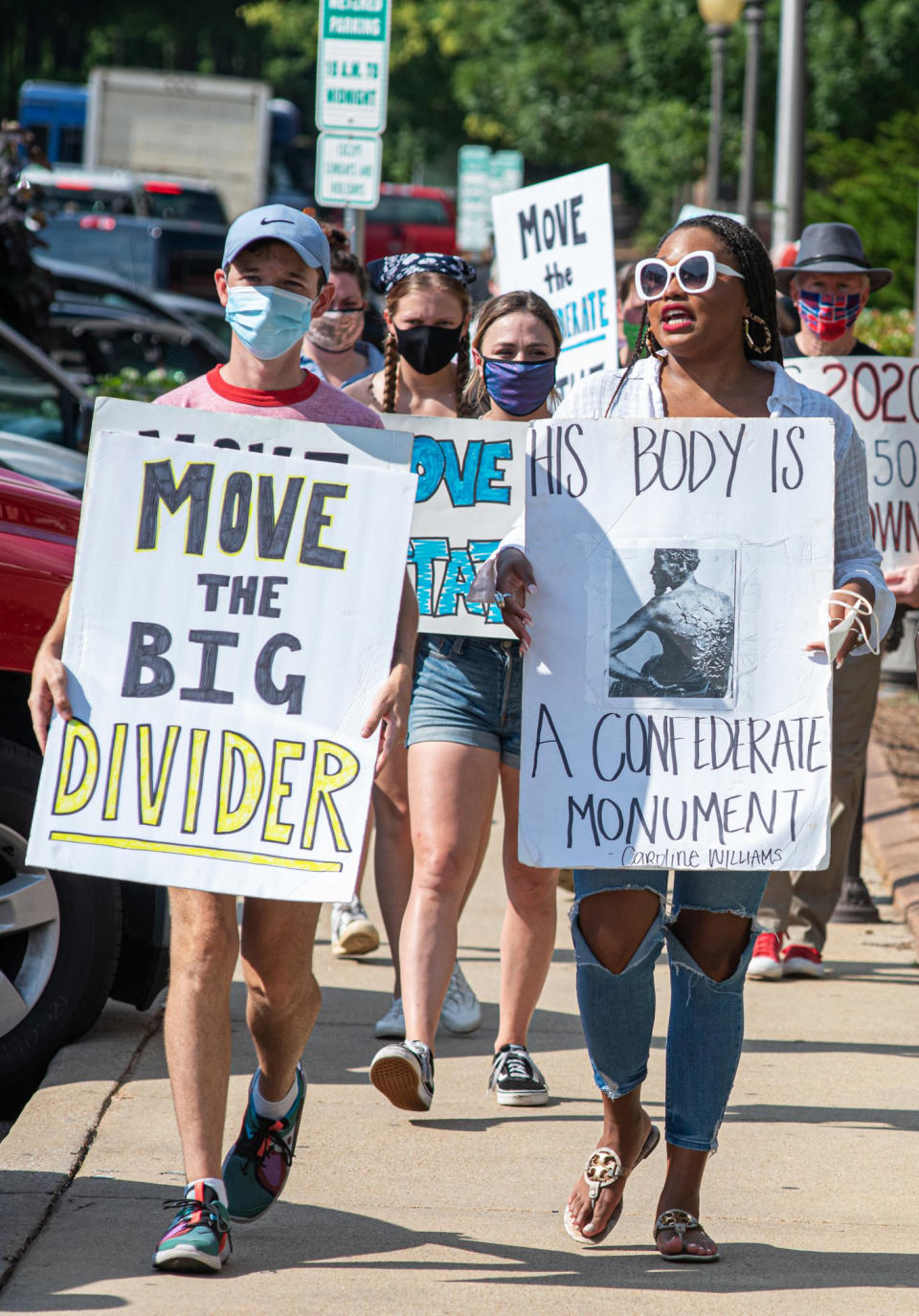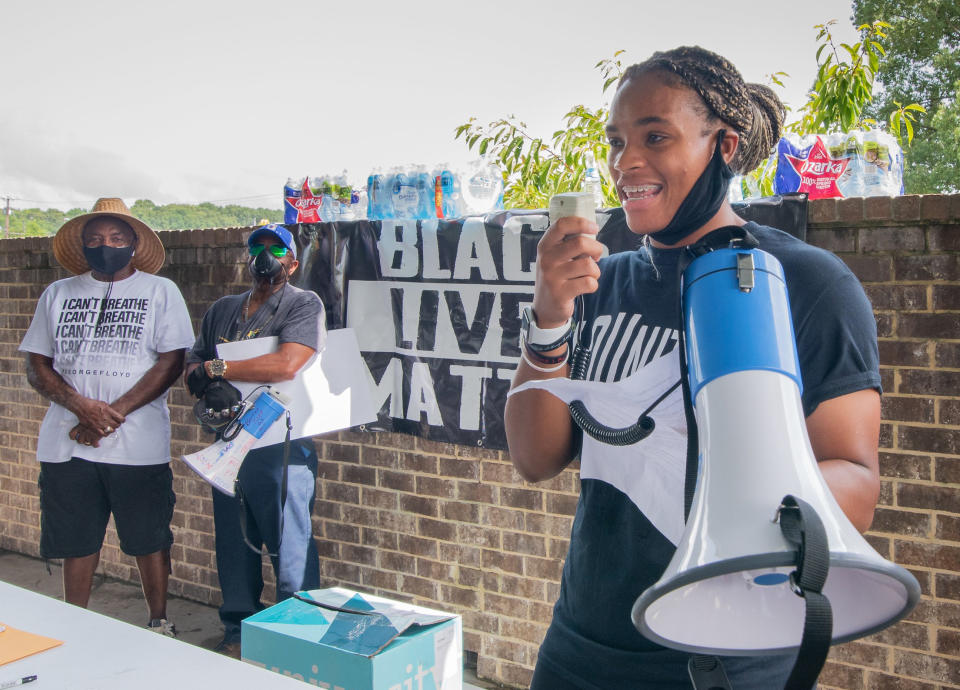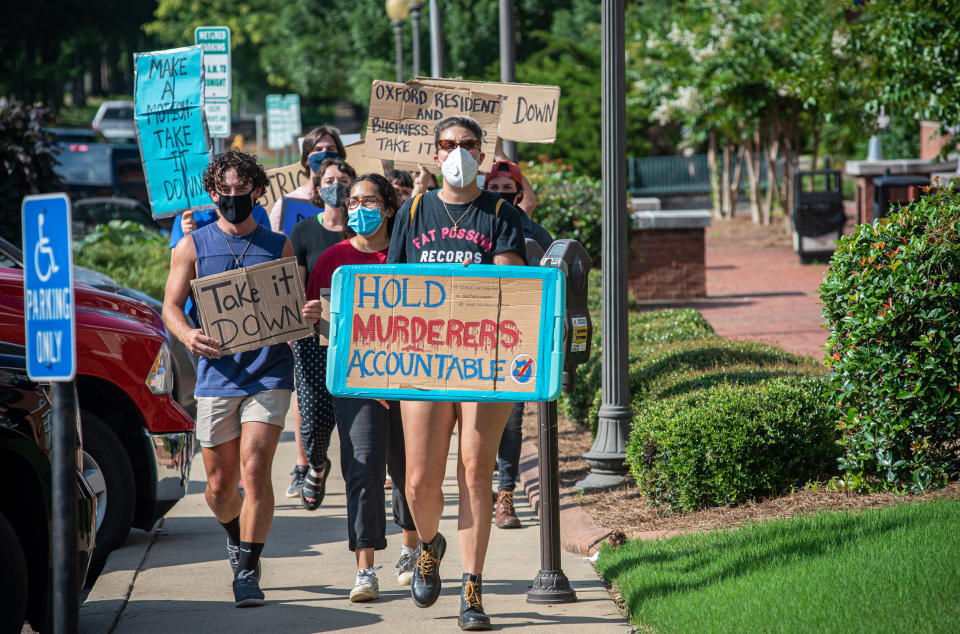College athletes push change in Southern town clinging to Confederate relics
OXFORD, Miss. — College sports are cultural staples in Southern university towns like this one, where they wield huge influence over devoted fan bases. That’s helped lead to a sudden social justice shockwave in recent weeks: College athletes in Mississippi and across the country have harnessed their collective power to call for the removal of Confederate monuments, symbols and honorifics and demand their institutions and communities account for racial inequities.
Stars from the University of Mississippi football team in this North Mississippi town have used their platform to push for the removal of Confederate statues on and off campus and marched alongside their coaches, fellow students and residents for social change. Meanwhile, a star running back at Mississippi State University, Kylin Hill, publicly threatened to quit his team if the Confederate battle emblem wasn’t removed from the state flag that had flown in Mississippi since 1894.
With college sports closely tied to the state’s identity, and bringing in hundreds of millions of dollars to the Mississippi economy each year, college athletes often have to face Mississippi’s history head on — though in the past they’ve done it quietly.
That’s now changed. Athletes at the University of Mississippi, also known as Ole Miss, in football and other sports are demanding the state, town and university take a hard look at themselves, get behind the flag change, remove the Confederate statues and contend with the university symbols and traditions that many consider racist.

“We wanted to let them know where Ole Miss Football stands,” said Ryder Anderson, a Black senior defensive end. “These are the changes that we want in the community: We want those statues removed. We wanted the flag changed.”
The addition of their voices to those of progressive state lawmakers who have long worked on these issues and young Black activists who recently took up the fight across the state appears to have helped increase the pressure, particularly with the state’s sudden decision to take down the state flag.
It’s hard to ignore the timeline: A push to change the flag that started decades ago came to an end about two weeks after the Southeastern Conference and the NCAA threatened in mid-June to remove sporting events from Mississippi, six days after Hill’s tweet and three days after nearly 50 Mississippi college coaches from across the state went to the Capitol to demand the legislature change the flag.
Some conversations, however, are ongoing. But these newly outspoken athletes said they aren’t going anywhere.
After Ole Miss said it had received approval from the state college board to move a Confederate statue at the center of campus to a remote Confederate graveyard last month, players on the football team took to their private group chat and decided they wanted more. They chose to pressure Lafayette County to remove the Confederate statue from the Oxford Square, the cultural and economic heart of this college town, saying in a video that “not all history is meant to be celebrated.”
The video, which included mostly Black players, went viral, earned an endorsement from two-time Super Bowl MVP Eli Manning, an alumnus of the Ole Miss program, who commended the “strong leaders who are advocating for change in our community.”
I’m proud to be an alumni of a program that is creating these strong leaders who are advocating for change in our community. #TogetherWeCan https://t.co/cGV7LFeczv
— Eli Manning (@EliManning) July 1, 2020
But the university later shared that it would invest more than $1.1 million in private funds to re-establish the Confederate statue on campus. A broadly circulated rendering included a seemingly random number of new headstones alongside the current grave marker for the more than 400 Confederate soldiers estimated to be buried there, a stone bench in front of the statue and a brick walkway with lighting. Critics called it a “shrine to the Confederacy.”

Then another blow: The all-white Lafayette County Board of Supervisors voted unanimously this week to keep the Confederate statue at the center of the Oxford Square, claiming its removal would not further unite the community.
These decisions have only motivated college athletes to continue speaking up — a departure for students who, unpaid at the collegiate level, often avoid hot-button issues out of fear of retribution or missing out on professional league opportunities.
“It's disappointing to see that's where people's priorities lie,” Anderson said. “But we’ll continue to put one foot in front of the other and continue to voice our frustrations and stand up for what we believe in to enact positive change.”
Though the statues still stand, it is undeniable that the power these players wield in Mississippi is immense — particularly because of the money they bring to their schools and the state.
Mississippi leaders did not just discover some newfound moral clarity in making the decision to change the flag, said Joshua Mannery, the Black president of the University of Mississippi student government who has helped organize social justice protests.
“This is maybe pessimistic, but it’s the money. Sports is the top two or three, if not the biggest, moneymaker for the state, especially at the universities that we have in the SEC,” he said.
Ole Miss Athletics pulled in more than $108.4 million in total revenue last year, according to an independent accounting prepared for the university, which doesn’t consider the greater economic stimulus it provides the state. Mississippi State University made nearly $104 million during the 2017-18 school year, according to the NCAA.
“When the pocketbook gets threatened, people change,” Mannery said.
‘We can’t just shut up and dribble’
While that change may not be altruistic in politics, college athletes in Mississippi and across the country appear to be committed to speaking out on social injustice.
Donnetta Johnson, a sophomore guard on the Ole Miss women’s basketball team, has led protests in this sports-loving college town. She said that in the past, athletes were encouraged to stick to sports, but that has since shifted in part because of the pandemic.
“Everything stopped. There’s nothing going on. There aren’t any sports. We can’t just shut up and dribble,” she said. “We can’t just stay in our lane. We have to speak out about what’s going on.”

But Anderson and Johnson are not just anomalies in the larger world of college sports.
Nationwide protests in response to police brutality, sparked by the death of George Floyd in Minneapolis police custody, have led Black athletes across every major U.S. sport to demand change. Some also shared personal stories of oppression.
Current and former student athletes — particularly at state schools with large sports programs like Florida State University, Oklahoma State University, University of Maryland, Penn State University and others — have notably seized this moment to open up about racist experiences in college athletics and use their platforms to push for systemic change.
Several athletes, predominantly football players, at the University of Texas published a letter last month calling for the school to rename several buildings carrying monikers of individuals tied to the state’s history of segregation and Jim Crow. They also asked the school to drop the university song, “The Eyes of Texas,” because of its connections to minstrel shows and called for the institution to donate a portion of the athletic department’s revenue to Black social justice causes.
"The recent events across the country regarding racial injustice have brought to light the systemic racism that has always been prevalent in our country as well as the racism that has historically plagued our campus," the students said in a letter posted to social media.
Related:
Even incoming freshman athletes have changed the dynamic. UCLA, University of Memphis and University of Kentucky were all trying to recruit basketball star Makur Maker, who ranked 75 on ESPN’s NBA Draft list.
But the 6-foot-11, 235-pound center announced earlier this month that he decided to commit to Howard University — a school that only won four of its 33 games last season — citing a need to support historically Black colleges and universities.
“I need to make the HBCU movement real so that others will follow,” he wrote on Twitter.

Richard Lapchick, the director of the Institute for Diversity and Ethics in Sport, has encouraged athletes to use their voices for decades, though he knows it puts their careers at risk. But now, as current and former student athletes seize this moment to push for systemic change, the risk appears to be shrinking.
“I think the involvement of athletes today and having their voices raised is probably the biggest game changer and among the things that I hope is going to sustain what's happening in this greater movement,” said Lapchick, who was attacked by a group of men that carved a racial slur into his stomach in 1978, as he led a sports boycott in South Africa to end apartheid there.
“Athletes speaking out is going to have an impact far into the future and make things happen that wouldn't have happened otherwise because they get people’s attention like other people don't,” Lapchick added.
Ole Miss athletes Johnson and Anderson said they were dismayed by the county’s decision not to remove the Confederate statue in the town square, as well as the university’s further investment in the one on campus — especially as nearby Bolivar County, which only desegregated its schools in 2016, announced it would move its Confederate statue this week.
But, Anderson said, those recent choices made by the white board of supervisors will only compel him and other athletes to speak up more, reiterating a line from a speech he gave at the end of a protest he led in Oxford: “I was infuriated, I was insulted, but I was not surprised.”
“People in high positions aren’t going to be able to do what they want and players are going to keep their mouths shut,” Anderson said. “They’re going to have to think, ‘What about the players? What about the community?’ Because now it’s not just going to slide under the radar. We’re going to speak up if there’s something wrong going on.”

